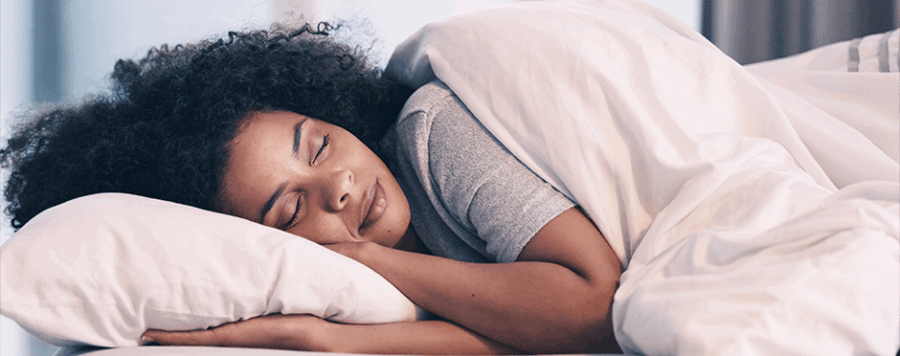Sleep and pain can be a vicious cycle. Whether recovering from surgery, dealing with an episode of lower back pain, or having chronic knee pain, sleep plays an important role in determining our pain levels. People with chronic pain are consistently shown to have poorer sleep quality than those without. We also know that improving our sleep quality can lead to improvements in pain in the same population.
Think of sleep like flushing the toilet. Over the course of a day, our body fills up with different toxins and chemicals that can contribute to pain, stress, and anxiety. A good night’s sleep will help flush those toxins down the drain. Without that toilet flush, those toxins and chemicals can stick around longer than we’d like.
Pain can lead to poorer sleep, leading to more pain, leading to poorer sleep, and thus the cycle begins. But the opposite is true as well. A good night of sleep can lead to improvement in pain, which can lead to improvement in sleep, which can lead to improvement in pain. But what can we do to improve our sleep? There are lots of things in our control that have been shown to improve our sleep quality. Let’s go over some of those.
Set A Regular Schedule
Try going to bed and waking up at the same time every day. This will improve your body’s biological clock and circadian rhythm, making falling asleep easier.
Sleep In Whatever Position Is Comfortable
There’s a lot of noise out there about the positions we should and shouldn’t sleep in. There is little to no evidence suggesting certain sleeping positions are better than others. Side sleeping will not worsen your back pain; sleeping on your stomach will not hurt your shoulder. The best sleeping position is the one that gets us the best night of sleep.
Find Your Pre-Bed Routine And Stick With It
What are some things we can do to decrease our pain and calm us down before bed? Maybe doing a stretch, which our PT showed us, helps reduce our pain. Maybe it’s participating in 10 minutes of meditation. Maybe it’s 10 minutes of foam rolling an hour before bed. Whatever will help our body enter a state of relaxation. Our PTs can help develop a strategy for you!
Avoid Caffeine Past 4 PM
Caffeine will inhibit your ability to fall asleep and decrease your sleep quality. Just because you’re falling asleep doesn’t mean you’re getting into deep sleep. So, avoid that late afternoon coffee!
Use Your Bed for Sleep and Sleep Only!
Train your body to associate your bed with sleep. This means avoiding watching TV, working, or eating in bed. Using your bed for other activities throughout the day can make it harder to differentiate your bedroom as a space for relaxation.
Participate In Some Exercise During The Day
It’s been shown that moderate to vigorous exercise improves our sleep quality (and pain). However, avoid exercising 2-3 hours before bed, as this can hinder sleep quality. Experiment with morning and afternoon workouts to see which fits for you!
Avoid Alcohol Before Bed
You might think alcohol improves your ability to fall asleep faster, but it’s going to lessen your ability to get into a deep sleep. Therefore, skip the evening cocktail and opt for better rest. Your body will thank you!
Improve Your Sleeping Environment
No lights, no noise. Set your space to a comfortable temperature (cooler is usually better). Avoid screen time before bed. We know it can be tempting to hunker down with your phone and catch up on your favorite show or scroll through social media, but your phone’s blue light can negatively affect sleep.
Prioritize Your Sleep
Most of us have developed habits of poor sleep hygiene, which may be contributing to our pain. There is endless research about how quality exercise and sleep can help improve our pain levels and live a more healthy and vibrant life. Our physical therapists can work with you to address your aches and pains through a quality exercise program and discuss some strategies to improve your sleep to help manage your pains. Get started by scheduling a free assessment at a location near you to connect with an expert who can help.
*Per federal guidelines, beneficiaries of plans such as Medicare, Medicaid, Tricare, VHA and other federally funded plans are not eligible for free assessments.
The Athletico blog is an educational resource written by Athletico employees. Athletico bloggers are licensed professionals who abide by the code of ethics outlined by their respective professional associations. The content published in blog posts represents the opinion of the individual author based on their expertise and experience. The content provided in this blog is for informational purposes only, does not constitute medical advice and should not be relied on for making personal health decisions.
References:
1. Azevedo E, Manzano GM, Silva A, et al. The effects of total and REM sleep deprivation on laser-evoked potential threshold and pain perception. Pain. 2011;152:2052–2058.
2. Alsaadi SM, McAuley JH, Hush JM, et al. The bidirectional relationship between pain intensity and sleep disturbance/quality in patients with low back pain. Clin J Pain. 2014;30:755– 765
3. Gupta CC, Sprajcer M, Johnston-Devin C, Ferguson SA. Sleep hygiene strategies for individuals with chronic pain: a scoping review. BMJ Open. 2023;13(2):e060401. Published 2023 Feb 2. doi:10.1136/bmjopen-2021-060401
4. Orlandi AC, Ventura C, Gallinaro AL, et al. Improvement in pain, fatigue, and subjective sleep quality through sleep hygiene tips in patients with fibromyalgia [Article in English, Portuguese]. Rev Bras Reumatol. 2012;52:666–678.
5. Siengsukon CF, Al-dughmi M, Stevens S. Sleep Health Promotion: Practical Information for Physical Therapists. Physical Therapy. 2017;97(8):826-836. doi:https://doi.org/10.1093/ptj/pzx057

 width="900"
height="356"
>
width="900"
height="356"
>
